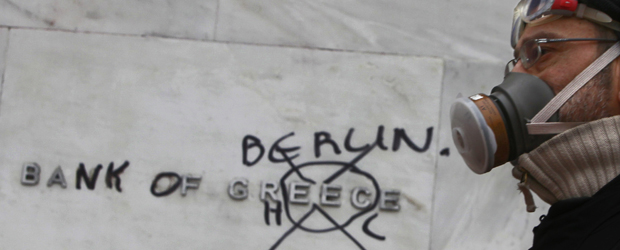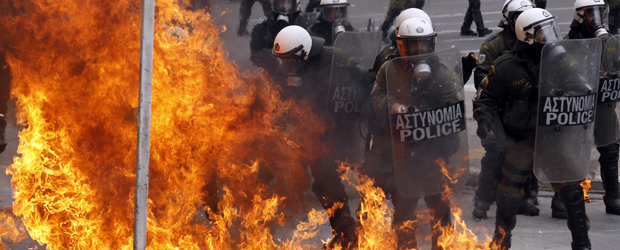‘Foul mood’ in Greece – but no pain, no gain
The former Greek finance minister tells Channel 4 News the mood in Greece may turn nasty over austerity cuts aimed at securing a bailout – but the country has to change to stay in the eurozone.

Protesters in Athens have clashed with police during demonstrations sparked by proposals for new austerity measures and cuts in Greece.
But as the protesters throw rocks and petrol bombs, and the police respond with tear gas, the political struggles are also ongoing.
Greek leaders are under pressure to come up with a package of cuts and reforms which meet with the approval of eurozone ministers before they can access a much-needed second bailout. The initial package Greece took to Brussels to secure the second bailout was rejected by the eurozone – parliament is set to vote on new, even more severe measures on Sunday to try and meet the eurozone’s conditions. Ministers want Greece to deliver a further 325m euros in cuts by a deadline of next Wednesday.
Greece needs the second tranche of bailout money – around 130bn euros – to avoid a messy default and ensure it can meet a loan repayment due on 20 March.
Default fears
There are fears a Greek default could endanger the already wobbly financial security of the eurozone, and ultimately lead to a break-up of the single currency, particularly if the contagion spreads to other eurozone countries.
However, implementing the measures the eurozone is demanding in Greece will be difficult: the country is already in the fifth year of a deep recession and the protesters on the streets say they cannot take much more. Unemployment is already above 20 per cent.
If Greece and Europe do not change their policy, conflicts and riots will be commonplace. GSEE union spokeswoman
A spokeswoman for the GSEE union, one of the two major unions in Greece leading a 48-hr strike, told Channel 4 News: “Life in our country becomes every day more dramatic. Unemployment, poverty and misery rampant, like the anger and frustration both for the functioning of government and the behaviour of the Europeans.
‘Conflicts and riots’
“The future will be very hard and confrontational if this policy continues. If Greece and Europe – especially Germany – do not change their restrictive and doctrinal policy, conflicts and riots will be commonplace.”
However, former Greek finance minister Stefanos Manos told Channel 4 News that Greece has to put up with austerity to ensure its economic survival – and its place in the eurozone.

“There are going to be demonstrations undoubtedly, they may become nasty. I am sure most Greeks understand in general terms (that there has to be some austerity), but they refuse to understand it when the austerity or the measures hit them, that’s when they stop understanding. That’s human nature – but we need to do this. In particular, there need to be structural reforms – and we need to do even more.”
Read more: Greek euro exit 'horrific' scenario
Reforms and the future
He believes that the new measures, which include public sector job cuts, pension reform, reducing the minimum wage by 20 per cent, and negotiating a debt write-off with banks, will ultimately be agreed by Greek politicians.
However he believes the key point is whether they are implemented – and told Channel 4 News that this cannot happen under the current government, a three-party coalition. Elections in Greece are due in April.
“The people who make up the government at the moment, I’m afraid, are not the right people to implement the measures. If they had been, they would have done so by now,” he said.
“The future depends on the Greek people. If they vote in again the party that is responsible for this situation, that is the will of the people. No one can stop someone from committing suicide. If they don’t, then there’s something new in the air, there’s hope.
“I would also say I have a firm belief that Greece can return to being successful quickly. I hope that Greece stays in the euro – this will hopefully be the rallying cry of a new party, a party very much in favour of Greece staying in the eurozone and doing what is necessary to do so.”